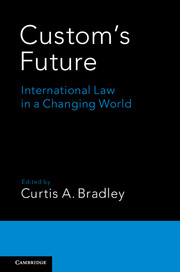Book contents
- Frontmatter
- Dedication
- Contents
- Notes on Contributors
- Introduction: Custom's Future
- 1 Custom's Past
- 2 Customary International Law Adjudication as Common Law Adjudication
- 3 Customary International Law as a Dynamic Process
- 4 Custom, Jus Cogens, and Human Rights
- 5 Customary International Law: How Do Courts Do It?
- 6 Custom's Method and Process: Lessons from Humanitarian Law
- 7 The Growing Obsolescence of Customary International Law
- 8 The Strange Vitality of Custom in the International Protection of Contracts, Property, and Commerce
- 9 The Decline of Customary International Law as a Source of International Criminal Law
- 10 Customary International Law and Public Goods
- 11 Reinvigorating Customary International Law
- 12 The Evolution of Codification: A Principal-Agent Theory of the International Law Commission's Influence
- 13 Custom and Informal International Lawmaking
- 14 Custom's Bright Future: The Continuing Importance of Customary International Law
- Bibliography
- Index
3 - Customary International Law as a Dynamic Process
Published online by Cambridge University Press: 05 February 2016
- Frontmatter
- Dedication
- Contents
- Notes on Contributors
- Introduction: Custom's Future
- 1 Custom's Past
- 2 Customary International Law Adjudication as Common Law Adjudication
- 3 Customary International Law as a Dynamic Process
- 4 Custom, Jus Cogens, and Human Rights
- 5 Customary International Law: How Do Courts Do It?
- 6 Custom's Method and Process: Lessons from Humanitarian Law
- 7 The Growing Obsolescence of Customary International Law
- 8 The Strange Vitality of Custom in the International Protection of Contracts, Property, and Commerce
- 9 The Decline of Customary International Law as a Source of International Criminal Law
- 10 Customary International Law and Public Goods
- 11 Reinvigorating Customary International Law
- 12 The Evolution of Codification: A Principal-Agent Theory of the International Law Commission's Influence
- 13 Custom and Informal International Lawmaking
- 14 Custom's Bright Future: The Continuing Importance of Customary International Law
- Bibliography
- Index
Summary
Today there is great debate about just how long customary international law takes to form, and how it can be changed. Ranged on one side are those “traditionalists” who maintain that customary law requires both (1) consistent state practice, and (2) opinio juris sive necessitatis, a belief among states that a customary practice is legally binding. Moreover, these traditionalists argue that both elements must persist over some extended period of time. That is, state practice must be longstanding, and even the opinio juris must be well grounded and consistent through time. This long gestation period, in turn, gives customary norms permanence and rootedness. This same quality of rootedness can make customary law norms difficult to change. That is because for a norm to change, both elements must be modified, and this modification, too, ought to take some time under the traditional view.
According to the traditional view, customary international law is like a giant ocean liner. It takes a long time to get up to cruising speed, and once it is headed in a particular direction, much effort is required to cause it to change course. Furthermore, the traditional view also is not merely a jurisprudential one about what characteristics customary international law “has.” It also incorporates a normative dimension, and traditionalists argue that there are good reasons for making customary international law difficult to create, and difficult to modify.
Ranged against this traditional view is an army of new approaches to customary international law, all of which view it as a more dynamic process and as more susceptible to change. According to some of these theories, a new consistent state practice can arise very quickly; no particular duration of the practice is required to establish a corresponding new norm of customary international law. Likewise, opinio juris can be formed in an “instant,” or at least very quickly. And some theories minimize or dispense with either the state practice requirement or the opinio juris requirement, thus making it even easier for customary norms to be created, or changed, since only one element needs changing.
This clash of approaches and theories has left customary law in a jurisprudential crisis. We might dismiss this as just another academic conundrum, of little interest to practitioners, except that customary international law is assuming enormous importance practically in a wide variety of fields.
- Type
- Chapter
- Information
- Custom's FutureInternational Law in a Changing World, pp. 62 - 94Publisher: Cambridge University PressPrint publication year: 2016
- 1
- Cited by



